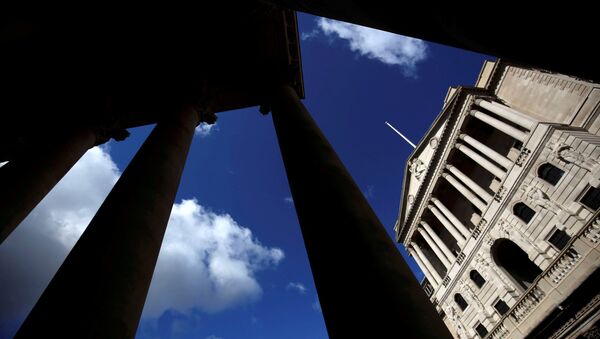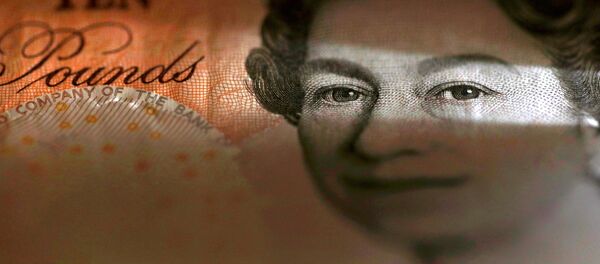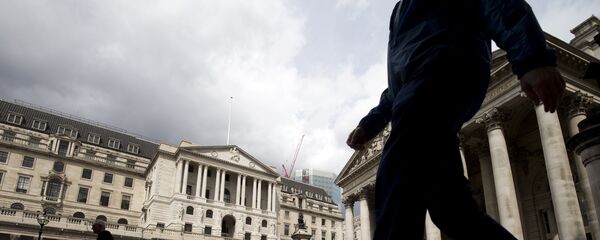Kristian Rouz –Given that the UK’s economic growth once again outperformed expectations in Q3, the Bank of England’s (BoE) rate hike decision – due in November – is almost certain. While market participants are already pricing in the rise of base borrowing costs to 0.5 percent, some officials point to falling retail sales, saying feeble consumption doesn’t support the rate hike case.
READ MORE: UK Economic Health in Doubt as Bank of England Nears Rate Hike
The UK’s economy rose 0.4 percent quarter-on-quarter in Q3, or 1.5 percent year-on-year, outpacing earlier expectations of 0.3 percent and 1.4 percent, respectively. Stronger growth was driven by the ongoing expansion in services and manufacturing – despite a stronger pound, UK’s exports in manufactured goods are doing well.
UK CPI is at 3% YoY.
— Charlie Bilello (@charliebilello) October 25, 2017
UK Unemployment is at a 42-yr low.
Record low central bank rate of 0.25% makes no sense. Hike coming. pic.twitter.com/k86PMNWTPk
Subsequently, inflation picked up again, overshooting the 2-percent target by almost 1-percentage point, meaning the BOE will use its firepower to contain the growth in prices.
But former BOE member David Blanchflower says the economy might not withstand higher central bank interest rates, which would harm GDP expansion.
"Inflation is set to drop after the one-off effects of the pound’s decline (following last year’s Brexit vote)," Blanchflower says.
However, the pound has rebounded to $1.31 in the recent months compared to its lowest rate of $1.16 after the Brexit vote last June – but inflation is still spiraling out of control.
In his opinion, the stronger Q3 GDP data and inflation – currently at 2.9 percent from a year ago – make the economy look good on the surface, while there is significant underlying weakness in the UK’s productive forces.
"We are looking at growth of under 1.5 percent every year from 2017 through 2019," Blanchflower said. “Even then the risks are to the downside due to uncertainty over Brexit."
“Falling real wages and falling retail sales suggest this is no time for a rate rise,” he added.
READ MORE: UK Economy Shows Signs of Rebound as Rate Decision Nears
Indeed, there is a huge problem with the UK’s labor productivity, weak salary growth, and somewhat low labor participation – however, these challenges are not quite as acute as in the US, where the Federal Reserve’s tightening cycle has been underway since December 2015.
There you have it.
However, another prominent British political figure, Jacob Rees-Mogg, spoke on the matter recently as well. Rees-Mogg is known as the ‘Trump of the UK’, and a possible replacement for Theresa May should the Tories be dissatisfied with her performance with regard to the economy and Brexit.
READ MORE: Report: UK 2018 Economic Outlook Improves as BOE Poised to Raise Rates
Rees-Mogg says Governor Carney is the ‘enemy of Brexit’ as central bank policies aimed at supporting the pound’s FX rate are not helpful amid the Brexit process.
"The fall of the pound has helped the economy," Rees-Mogg told BBC 5.
An interest rate hike would most likely push the pound’s FX rate higher, meaning Rees-Mogg is indirectly advocating lower borrowing costs. He hasn’t provided a commentary on the rampant inflation.
“We don't legally have to pay any money at all — under international UK and EU law, if we are going to leave with no deal we have to pay no money whatsoever, we can immediately lift the tariffs (on shoes, clothing, and footwear) that make life for the poorest so much harder,” Rees-Mogg said.
This, however, would mean even higher consumer prices and overall inflation, and would require a central bank intervention.
If UK inflation overshoots 3 percent, BOE Governor Mark Carney would have to explain to the Chancellor of the Exchequer the reasons, and the measures he is going to undertake. This would be a rare such occasion since the central bank was granted independence back in 1997 – and could possibly bring the BOE back under the control of Downing Street.





